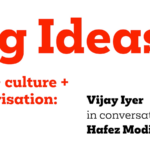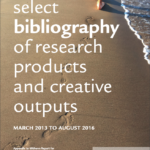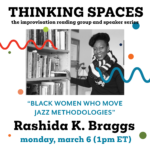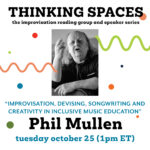Research Library
As part of our commitment to making our work and outputs accessible, and to generate further dialogue on the issues we explore, IICSI has created an online Research Library. Here you will find a range of pieces including films, articles, think pieces, and interviews. Please use the search function or browse, and check back again as this library will be updated regularly.
Research outcomes related to the Improvisation, Community, and Social Practice project (2007-2013) are forthcoming.

“Dive” into Ecological Awareness by Improvising Under Water
Contact and Flow Festival March 3rd-17th, 2024 – Bacalar, México By: Lucas Carravetta Just four hours beneath Cancún’s wild party scene, along the calm shores of a freshwater lagoon, international…

Big Ideas In Improvisation 2023: Vijay Iyer and Hafez Modirzadeh in Conversation
On Saturday, October 21st, 2023, IICSI and Musagetes presented the Big Ideas in Improvisation lecture, “Vijay Iyer and Hafez Modirzadeh: in Conversation” as a part of IICSI’s fourth annual Improvisation Festival: IF 2023. The event was recorded in its entirety, and is now available to watch below.

Select Bibliography of Research Products and Creative Outputs, September 2017 to September 2022
IICSI’s research outcomes during the SSHRC PG (2012–2022) – including innovations in adaptive technologies, web platforms and apps for musical improvisation, critical theory, manuals and toolkits for practitioners in social services, rehabilitation therapy, music instruction and community arts – have been broadly shared via our peer-reviewed journal…

Select Bibliography of Research Products and Creative Outputs, March 2013 to August 2016
Attached you will find a bibliography of research products and creative outputs during the first half of IICSI’s SSHRC Partnership Grant, 2013–2016. The first half of IICSI’s Partnership Grant was, in short, tremendously productive.

Thinking Spaces 2022–23: Rashida K. Braggs
This Thinking Spaces session,“Black Women Who Move Jazz Methodologies” with guest Rashida K. Braggs, took place on March 6, 2023. More About this Talk: How do you make a book…

Thinking Spaces 2022-23: “Improv for Scientists”
Improvisational exercises have been a key element of theatre training for decades. With minor modification, these same exercises can be used in training scientists (and future scientists) to be better communicators.

Thinking Spaces 2022-23: Darren O’Donnell
This Thinking Spaces session, “Chance as Co-Director: Working with the Whims of Children” with guest Darren O’Donnell, took place on January 18, 2023. MORE ABOUT THIS TALK: In this talk,…

Thinking Spaces 2022-23: Eric Lewis
This Thinking Spaces session, “Improvising the Archive: Medea Electronique’s Archive of Digital Art,” with guest Eric Lewis, took place on November 16, 2022. MORE ABOUT THIS TALK: Eric will discuss…

Thinking Spaces 2022-23: Hilary Bradbury
This Thinking Spaces session, “Action Research Transformation: Liberating the Spirit of Yes/And at a Time of Eco-Social Crisis” with guest Hilary Bradbury, took place on November 2, 2022. MORE ABOUT…

Thinking Spaces 2022-23: Phil Mullen
This Thinking Spaces session, “Improvisation, devising, songwriting and creativity in inclusive musical education” with guest Phil Mullen, took place on October 25, 2022. MORE ABOUT THIS TALK: In this session…







